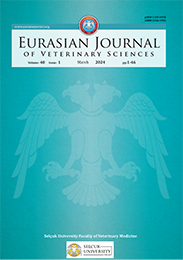| 2017, Cilt 33, Sayı 2, Sayfa(lar) 081-088 |
| [ Türkçe Özet ] [ PDF ] [ Benzer Makaleler ] |
| Effectiveness of bovine immunoglobulin G against Salmonella infections in mice |
| Hasan Hüseyin Hadimli1, Gökçenur Sanioğlu Gölen2, Zafer Sayın1 |
| 1Selçuk Üniversitesi, Veteriner Fakültesi, Mikrobiyoloji Anabilim Dalı, Alaaddin Keykubat, Yerleşkesi, Konya, Türkiye 2Aksaray Üniversitesi, Veteriner Fakültesi, Mikrobiyoloji Anabilim Dalı, Aksaray, Türkiye |
| Keywords: Passive immunity, Salmonella, IgG, mice |
| Downloaded:1255 - Viewed: 2166 |
|
Aim: This study was aimed to determination of effectiveness
of the bovine Immuneglobuline G (IgG) against Salmonella
infections caused by Salmonella Dublin, S. Typhimurium, S.
Kentucky or S. Anatum.
Materials and Methods: Cattle were immunized with inactive monovalent, bivalent and combined Salmonella vaccines, three times at 21 days intervals. Immunized cattle blood samples were collected at 10 days after last vaccination and titres of IgG to Salmonella antigens were measured micro Serum Agglutination Test. A total of 100 mice (total 10 vaccine groups and each group included 10 mice) were challenged with Salmonella strains by oral route. After challenge, IgG to mice were administrated by oral route. Mice were observed for occurence of morbidity and mortality for 20 days. Also, feacal samples were analyzed to determination influence of IgG on spread of Salmonella species by feaces. Results: The antibodies titres in blood of immunized cattle were found to be high than before vaccination and controls. The numbers of morbidity and mortality in groups of vaccine were determined as 9 in combined vaccine (6 in S. Dublin, 2 in S. Typhimurium and 1 in S. Kentucky), 3 in bivalent vaccine (in S. Typhimurium), and 2 in monovalent (1 in S. Anatum and S. Kentucky). The re-isolation number of Salmonella strains were lower from internal organs and feacal samples of mice in all groups. Conclusions: In conclusion, it was observed that IgG of immunized cattle is can be useful for protection against Salmonella infections, but limited. |
| [ Türkçe Özet ] [ PDF ] [ Benzer Makaleler ] |




